Rejection is one of those universal experiences we all face at some point. Whether it’s a missed opportunity at work, a declined relationship, or even a small daily letdown, rejection can cut deeper than we expect. Rejection may feel like a setback, but it doesn’t have to shape your entire story. It can become the spark that drives you toward even greater achievements.
If you’ve been wondering how to deal with rejection in life, this guide is for you. We’ll explore why rejection hurts, how to process it, and—most importantly—how to turn it into a stepping stone for growth. By the end, you’ll see rejection not as an obstacle, but as an opportunity to thrive.
Table of Contents
Why Rejection Feels So Painful
Before diving into how to deal with rejection in life, it’s important to understand why it affects us so deeply. Rejection is more than just an emotional bruise—it’s tied to our biology and psychology.
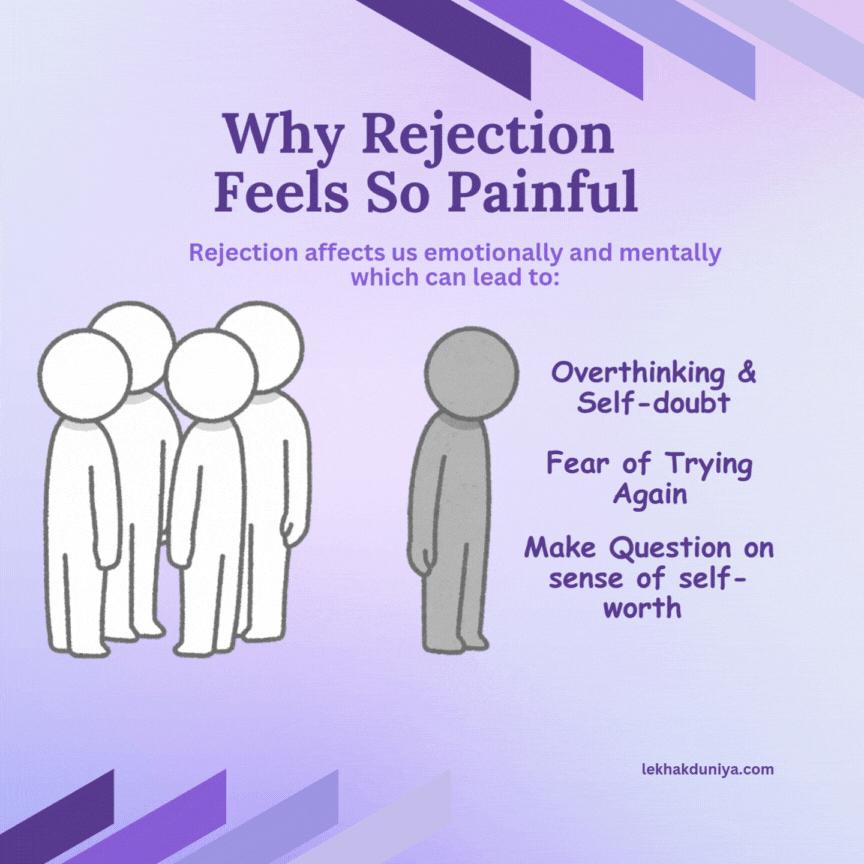
1. The Science of Rejection
When you experience rejection, your brain reacts in surprising ways. Studies show that the same areas of the brain that process physical pain are activated during emotional rejection. This is why rejection can feel like a punch to the gut, even when no physical harm is done.
2. The Emotional Toll of Rejection
Rejection challenges one of our core human needs: belonging. When we’re turned down, it can make us question our worth, triggering feelings of self-doubt and inadequacy.
- In relationships: A breakup or unreciprocated feelings can lead to fears of unworthiness.
- In careers: Being passed over for a promotion or job can feel like a judgment on your skills or potential.
Understanding these emotional and biological responses is the first step to learning how to deal with rejection in life. When you know why rejection hurts, you can start addressing its impact.
Changing Your Mindset About Rejection
The way you think about rejection can shape your ability to move forward. Rather than seeing rejection as a setback, view it as a chance to grow and learn from the experience.
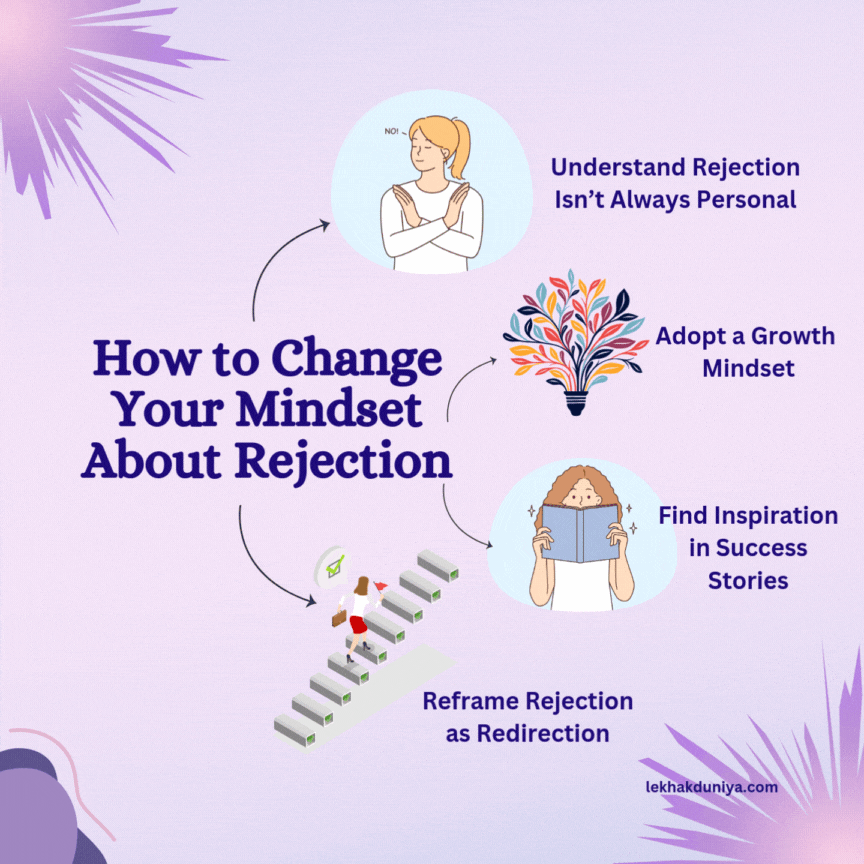
Here’s how:
1. Recognize Rejection Isn’t Personal
Many rejections have little to do with your worth. They usually depend on factors like timing, individual preferences, or situations that are out of your hands. By detaching your self-esteem from the outcome, you can reduce the sting. Realizing this is a key step in understanding how to deal with rejection in life without letting it damage your confidence.
A growth mindset encourages you to view challenges as stepping stones for learning and self-improvement. If you didn’t get the job or the date, ask yourself: What can I learn from this experience? Maybe it’s a chance to sharpen your skills or realign with your true goals.
3. Find Inspiration in Success Stories
Even the most successful people have faced rejection.
- J.K. Rowling: Faced rejection from 12 publishers before finally bringing Harry Potter to life and turning it into a global sensation.
- Oprah Winfrey: Fired from her first TV job but went on to become an iconic media mogul.
- Michael Jordan: Cut from his high school basketball team but became a global legend.
Their stories remind us that learning how to deal with rejection in life is often a stepping stone to something greater.
4. Reframe Rejection as Redirection
Sometimes, rejection is life’s way of guiding you to a better path. Didn’t get that job? Maybe it wasn’t the right fit, and another opportunity will align more with your strengths and passions.
Emotional First Aid After Rejection
When you know how to deal with rejection in life, it’s essential to take care of your emotional well-being. Think of it as giving yourself first aid for your heart and mind.
Here are practical steps to recover after facing rejection:
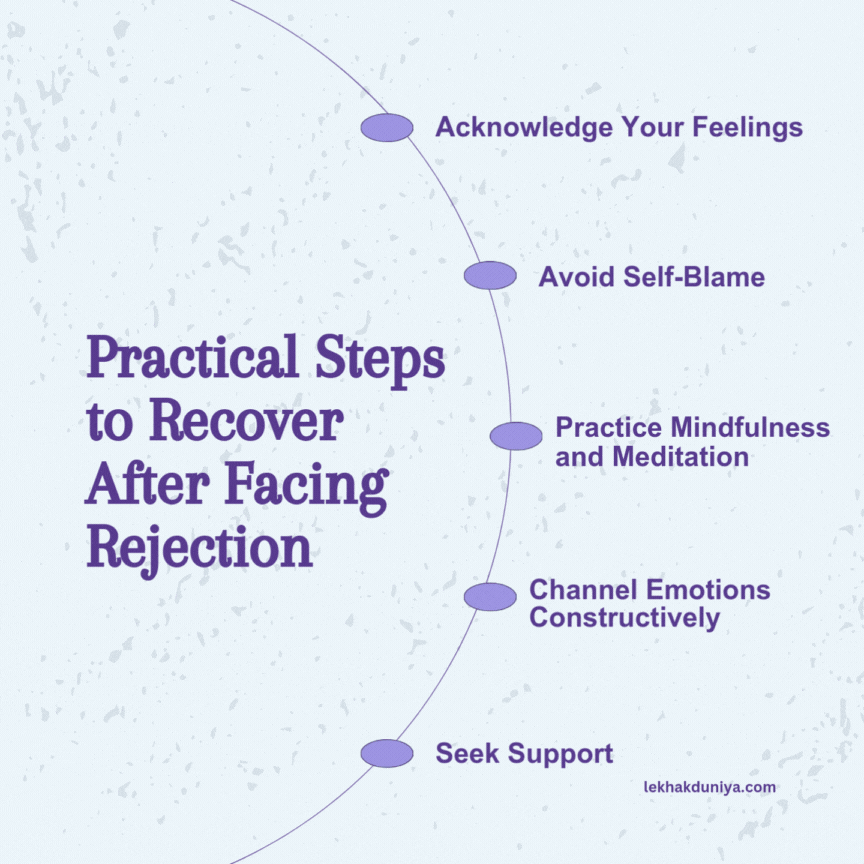
1. Acknowledge Your Feelings
Pretending rejection doesn’t hurt; it will only make things worse. Allow yourself to feel emotions like disappointment, sadness, or frustration—they’re a natural part of the healing process. Writing down your thoughts in a journal or opening up to a trusted friend can make it easier to understand and work through these feelings.
2. Avoid Self-Blame
Rejection often leads to overthinking, but blaming yourself isn’t constructive. Focus on the effort you made, and remind yourself that rejection doesn’t define your worth.
3. Practice Mindfulness
Mindfulness can ground you in the present moment, helping to break the cycle of rumination. Simple breathing exercises or meditation can bring clarity and calm during tough times.
4. Channel Emotions Constructively
Use rejection as fuel for positive action. Exercise, take up a creative hobby, or start working on a new goal. Redirection of energy can help you heal.
5. Lean on Your Support System
Talking with people who care about you can ease the pain of rejection. A supportive network reminds you that you’re not alone and that rejection is a shared human experience.
Learning how to deal with rejection in life isn’t just about recovery—it’s about building emotional resilience for the future.
Practical Strategies to Handle Rejection
Once you’ve processed the emotional aftermath, it’s time to take actionable steps to move forward. Overcoming rejection involves more than just emotional recovery. It requires actionable strategies to grow and improve.

Here are practical strategies to handle rejection:
1. Seek Constructive Feedback
Whenever possible, ask for feedback to understand what went wrong. Whether it’s a job interview or a creative pitch, feedback can help you improve for the next opportunity.
2. Celebrate Effort, Not Just Outcomes
Trying itself is an accomplishment. Celebrate your courage to put yourself out there, even if the result wasn’t what you hoped for.
3. Focus on Self-Improvement
Use rejection as motivation to grow. This process is key to mastering how to deal with rejection in life effectively.
For example:
- Enhance your skills through courses or training.
- Learn more about your field or interests.
- Work on personal development, such as improving communication or emotional intelligence.
4. Keep Moving Forward
Resilience is built through persistence. Each rejection you encounter is a stepping stone, guiding you closer to your ultimate success.
How to Find Opportunity in Rejection
Rejection isn’t just an obstacle; it’s often a gateway to unexpected opportunities. Some of the greatest opportunities in life emerge after rejection.
Here’s how to uncover the silver lining:
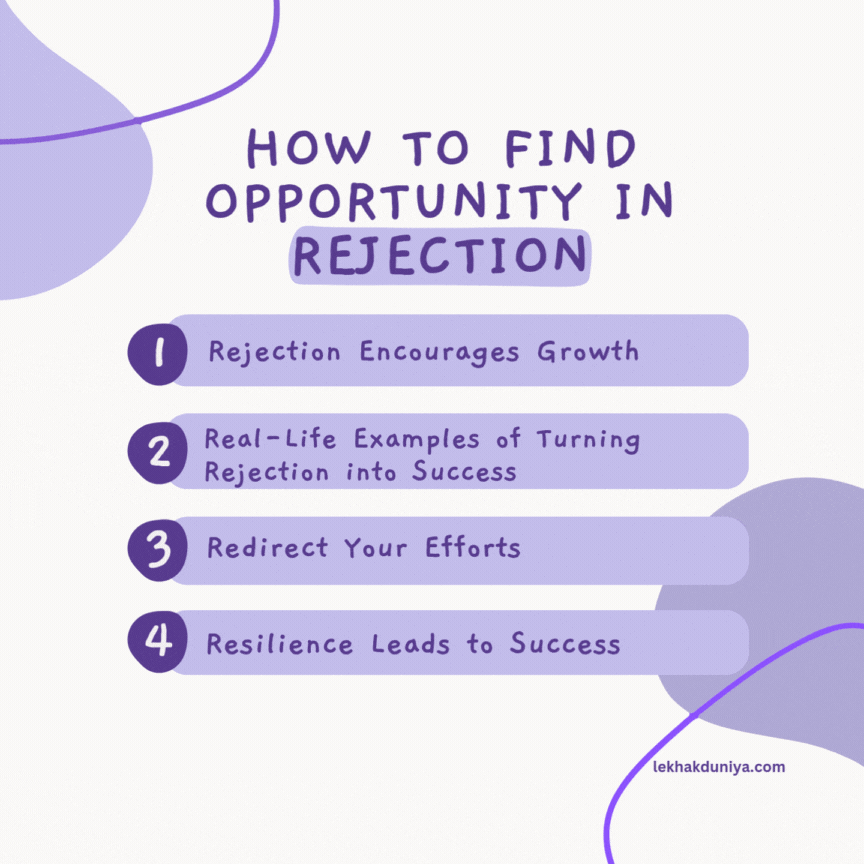
1. Rejection Encourages Growth
Rejection challenges your boundaries, encouraging you to step out of your comfort zone, adjust your approach, and discover new strengths. It challenges you to rethink your strategies and refocus on your goals.
2. Real-Life Examples of Turning Rejection into Success
- Steven Spielberg: Denied entry to film school but became one of the greatest filmmakers of all time.
- Ariana Huffington: Rejected by dozens of publishers before founding The Huffington Post.
These examples remind us that learning how to deal with rejection in life can lead to breakthroughs you never imagined.
3. Redirect Your Efforts
At times, rejection is life’s way of guiding you toward a path that aligns better with your goals and potential. Use it as an opportunity to explore new directions that align better with your goals and passions.
4. Resilience Leads to Success
Mastering how to deal with rejection in life helps you build unshakable resilience and grow stronger with each challenge. With every rejection, you build the tools to navigate future setbacks and pursue bigger dreams.
Final Thoughts: Rejection as a Path to Growth
Rejection is an inevitable part of life, but it doesn’t have to define your path or limit your potential. By understanding why rejection hurts, changing your mindset, and applying actionable strategies, you can turn it into a powerful tool for growth.
The secret to success lies in persistence. Every “No” you hear brings you closer to your “Yes.” Learning how to deal with rejection in life isn’t just about surviving setbacks—it’s about thriving because of them. Every rejection teaches you something valuable and brings you closer to your goals.
The next time rejection comes your way, see it as a detour, not a dead end. It’s a chance to redirect, grow, and find an even better path forward. Embrace rejection, and let it guide you toward the success you deserve.
Call to Action
Rejection is tough but it’s also an opportunity to grow and thrive. Have you ever faced a challenging rejection that taught you something valuable? Share your experience or your strategies for handling rejection in the comments below!
If this guide on how to deal with rejection in life resonated with you, don’t forget to share it with someone who might need encouragement. Let’s transform every setback into a powerful step forward toward success!

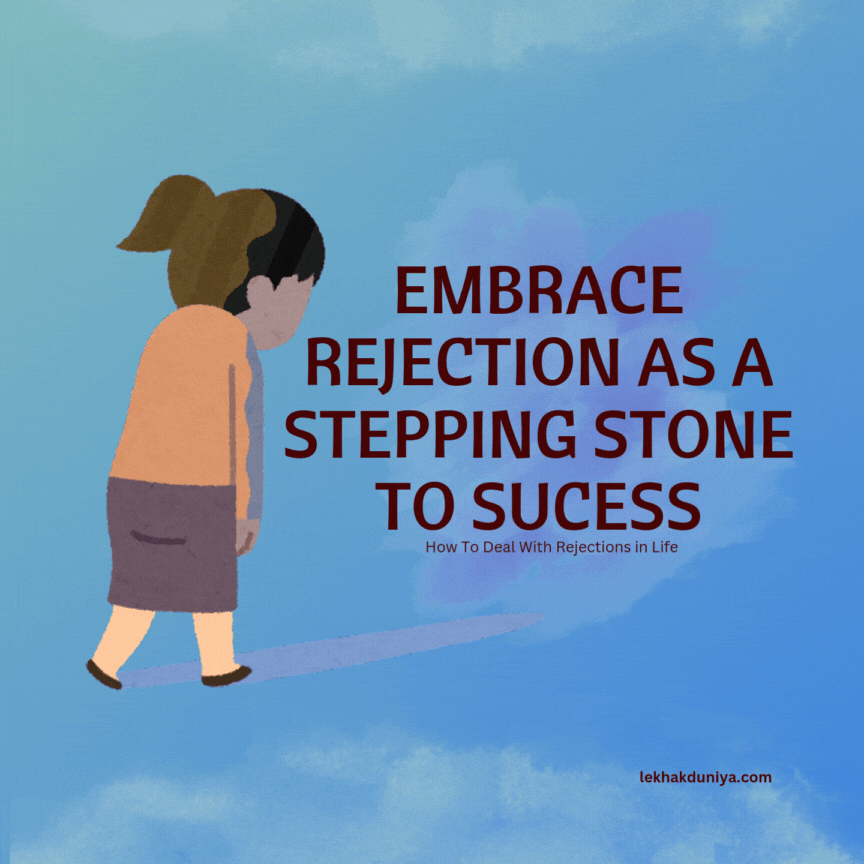


Noodlemagazine This is really interesting, You’re a very skilled blogger. I’ve joined your feed and look forward to seeking more of your magnificent post. Also, I’ve shared your site in my social networks!